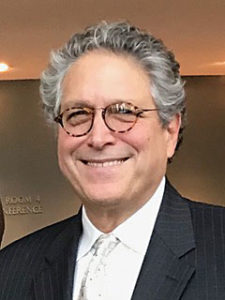By Susan Gonsalves, Contributing Writer

Photo/submitted
Sharon – Ted Ludwiczak, a refugee from Poland survived the Nazis invasion and Russian occupation to settle in the U.S. and work as a contact lens grinder. In his 60s, without any experience, he was compelled to sculpture faces into a wall along the Hudson River, becoming an acclaimed artist.
At 93, Harry Bernstein started writing about his life before World War I in northern England, the anti-Semitism he experienced and his sister’s forbidden romance with a Christian. His memoir was published when he was 96.
Bruce Frankel highlighted these individuals and others like them in his award-winning, best seller “What Should I Do with the Rest of My Life?” published by Penquin, 2010.
The author’s life is equally as compelling.
Frankel has always been a storyteller – starting as an eight-year-old who published his own mimeographed five cent newspaper called “The Item.”
“My claim to fame was an article about a boy who jumped off his dresser and landed with his teeth in the headboard,” Frankel recalled.
The Miami Herald picked up the story of the budding journalist and “so began my career,” he said.
Born in Hollywood, Fla., he moved to Curacao in the West Indies as a boy, honing his writing skills composing letters to sports figures. Eventually, Frankel moved to Long Beach, N.Y. where he graduated high school.
After earning a bachelor’s degree in government from Franklin & Marshall College, he worked as a psychiatric aide, wrote poetry and launched what was to become an award-winning journalism career.
Frankel has fond memories of his days as a local reporter in northern Westchester, N.Y., finding satisfaction investigating topics such as a fire set by bullies at a senior group home. His reporting led to state legislative action.
“I think the work I liked best was reporting that was local and made a difference,” Frankel said.
His varied career took him to USA Today, where he covered major trials including John Gotti’s third, the Oklahoma bombing, and the first World Trade Center bombing in 1992.
“That stayed with me,” Frankel said. “So many were predicting if we didn’t understand radical Islamic cells in the U.S. and the FBI didn’t coordinate, we were likely to see worse…And those predictions were fulfilled.”
A cancer scare made him re-evaluate his life’s direction, steering him toward creative writing, but first he and another reporter were hired by People magazine to start an investigative unit.
Although he expanded his skills over four years by composing comprehensive, long-form magazine pieces on subjects like hunger in America, the job was not for him. He quit.
Frankel went on to co-author the best-selling “World War II: History’s Greatest Conflict” (Little, Brown), ghost write and edit several books for others and at age 51, enroll as a graduate student at Sarah Lawrence College, majoring in writing/poetry.
“Graduate school was like Alice in Wonderland, having amazing teachers and being in heaven discussing ideas, listening to young, crackling minds. I loved it,” Frankel said.
Frankel heard from a former Time Inc. colleague, who was let go from his job at age 60.
“Following a four glasses of water lunch,” Frankel said, they decided to team up to write stories about people who succeeded after 60. But they didn’t want to highlight individuals with prior wealth or achievement.
“We wanted people who created success for the first time and did things that were significant, fulfilled an ambition and developed a path,” Frankel explained.
And, “What Should I Do with the Rest of My Life,” was the result.
Today, Frankel is still spreading the message about the value of older people and fighting ageism as a frequent guest speaker. He is also co-president of The Life Planning Network, co-leader of its New England chapter and editor of its journal.
The nonprofit organization is comprised of professionals from diverse fields who look at life holistically and help guide people to “optimize” the second half of their lives.
“Someone who views aging with fear and sees it as an inferior part of life is more likely to get ill and not recover,” Frankel said.
The older generation should instead be embraced and accommodated in the workforce, so they can pass on knowledge and wisdom, he said.
Frankel is also chief content officer at BSLI Redstring, an online platform for community building with nonprofits and businesses. He’s working on a project developing an online “village experience,” for the LGBT community of New York City.












